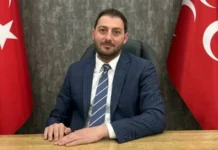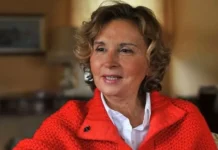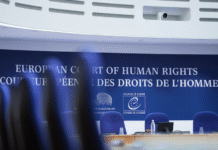A media worker who worked for a critical national newspaper has been finally brought to the court for a trial hearing after months of jail time. Yet, it turned out that he has no lawyer assigned to represent him in the case in a flagrant violation of the law on criminal procedures.
The scandal was exposed when İsmail Küçük, 42-year old sales manager in the advertising department of Zaman, one-time Turkey’s largest national daily, appeared before the panel of judges in İstanbul’s No.13 High Criminal Court on September 18, 2017. He was facing three aggravated lifetimes sentencing and additional 15 years jail time on fabricated terrorism and coup plotting charges. Judges were surprised he had no lawyer present in the court room to defend him.
Turkish law requires the government to appoint a lawyer to defend suspects in criminal cases from bar associations in case the defendant cannot afford one or could not hire a lawyer. Nobody seemed to have bothered to look into his case whether he had a lawyer despite the gravity of the charges leveled against him. The prosecutor who charged him should have noticed that long before as the law also required an attorney to be present during the interrogation in the police custody, during the deposition at the prosecutor’s office and at the arraignment hearing when he was formally arrested.
One of the judges in the court asked him how that happened. Küçük responded by saying that nobody briefed him about his rights and did not know whether he can get a government-appointed one for the trial. It could have been difficult to find a lawyer even if he wanted anyway given the fact that most lawyers in Turkey do not want to represent journalists’ cases. The Bar Associations assign lawyers to these cases as required by the law but many either do not show up or make up an excuse to drop client for fear of getting arrested. Over 550 lawyers are currently arrested in Turkey and some represented journalists in the past. Access to a lawyer for detainees have become one of the major problems in today’s Turkey where the rule of law has effectively ceased to exist.
Friends called Küçük as “Bonus İsmail” because of his curly hair that resembled to a character with a luscious curly hair featured in a bank commercial that advertised bonus points every time the bank credit card holder spends money. The ad went viral in Turkey. He was quite popular and being loved by all in the newspaper. He has been active in organizing football tournaments among various departments in the newspaper in his spare time.
Küçük was charged along with 30 other journalists and media workers in Turkey’s largest freedom of press case where all faces similar accusations and looking into lifetime sentencing if they get convicted. Most names in the case are prominent columnist and senior editors such as Şahin Alpay, Mümtaz’er Türköne and Ali Bulaç, leaving many wondering why a sales manager got placed in the same basket with others. Even the judge asked him why he was included in this case file. Nobody knew.
The 64-page indictment does not have any clues to why he got indicted and what the evidence was, if any. It only mentions his name twice: One as a suspect with his identity information on page four along with all the other 30 journalists and media workers.
The second time the prosecutor referred his name in the indictment is on the last page where all media workers were mentioned as collectively committing a crime in general references. The code on the criminal procedure (CMUK) requires all suspects must be presented individually with specific charges, evidences, their role in the crime. Yet, prosecutor did not identify which suspect committed what crime at all. What is more, the prosecutor invented new crimes such as working for a critical daily which has no standing on the criminal law at all.
Küçük’s Linkedin profile shows he was working for the Dogan Media Group since November 2016. He worked for Zaman between 2011 and 2016. When the government seized Zaman daily on March 2016, he said he continued working for the trustees appointed by the government to run the newspaper. He was sales manager in Merkur media between 2003 and 2009 and worked for a company called Timeline for over 4 years before that.
In his defence, Küçük questioned these conflicts in the indictment. “My job is advertising, sales and marketing. I work on a payroll plus commissions from the contracts I secure for the newspaper. In the indictment, I saw my name in the conclusion part only,” he said.
Küçük also pointed out that his purchase of a company car that was offered to employees on a discount when the company wanted to liquidate aging fleet was listed as a crime in the indictment. “I am facing three aggravated lifetimes sentencing because I bought the company car from the liquidation program,” he decried. I had driven this car for 14 months until I was detained.
Küçük was formally arrested on January 27, 2017 and appeared in the court for the first time after spending 231 days in the pre-trial detention. The court decided to keep in jail as trial proceeds during the first hearing in September. The next trial hearing was set for December 8, 2017.
Turkey is the biggest jailer of journalists in the world. The most recent figures documented by the Stockholm Center for Freedom (SCF) has showed that 280 journalists and media workers are now in jails as of October 8, 2017, most in pre-trial detention languishing in notorious Turkish prisons without even a conviction. Of those in Turkish prisons, 255 are arrested pending trial, only 25 journalists remain convicted and serving time in Turkish prisons. An outstanding detention warrants remain for 134 journalists who live in exile or remain at large in Turkey.
Detaining tens of thousands of people over alleged links to the movement, the government also closed down more than 180 media outlets after the controversial coup attempt.
Turkey survived a controversial military coup attempt on July 15 that killed 249 people. Immediately after the putsch, the Justice and Development Party (AKP) government along with Turkey’s President Recep Tayyip Erdoğan pinned the blame on the Gülen movement.
Fethullah Gülen, who inspired the movement, strongly denied having any role in the failed coup and called for an international investigation into it, but President Erdoğan — calling the coup attempt “a gift from God” — and the government initiated a widespread purge aimed at cleansing sympathizers of the movement from within state institutions, dehumanizing its popular figures and putting them in custody.
Turkey has suspended or dismissed more than 150,000 judges, teachers, police and civil servants since July 15. Turkey’s Justice Ministry announced on July 13 that 50,510 people have been arrested and 169,013 have been the subject of legal proceedings on coup charges since the failed coup.
















[…] time largest circulated daily, has ruled to release media workers Hüseyin Belli, Onur Kutlu and İsmail Küçük on Friday as the court ruled for continuation of pre-trial detentions of other prominent […]